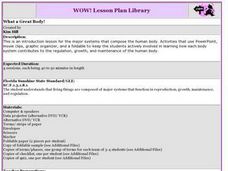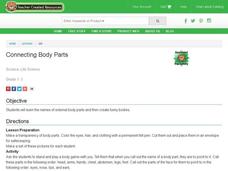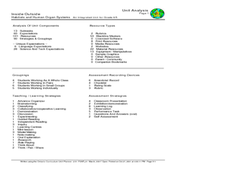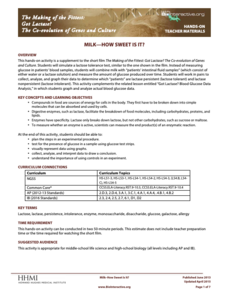College Board
AP® Psychology: Special Focus - The Brain, the Nervous System, and Behavior
How does the brain send signals to the rest of the body? Scholars research and analyze the functions of the brain and the central nervous system in the human body. Using hands-on activities, reflections, and research, they begin to...
Baylor College
Breathing Machine
Take a deep breath and have your class construct working models of a lung! Using 500ml plastic bottles as the chest cavity, and balloons for the lung and the diaphragm, learners work in groups to make a model. The models help them to...
Curated OER
The Human Body, Incorporated
Second graders research each body system and writer a letter t Joe, the CEO of the Human Bdy, Incorporated, who is downsizing. In their letter, 2nd graders tell him which body parts to keep as employees.
Curated OER
Skeletal, Skin, and Muscular Systems
Eighth graders explain the functions of various body systems. Using a concept map, 8th graders identify and explain the fuctions of the skeletal, skin, and muscular systems of the body. After completing their concept map, students...
Curated OER
What a Great Body!
Students use PowerPoint, movie clips, graphic organizers, and a foldable to research and display information about how each body system contributes to the regulation, growth, and maintenance of the human body. Additional links and...
Curated OER
Connecting Body Parts
Students identify body parts. In this human body lesson, students play a game in which they point to body parts called out by the teacher. Students draw, label, and assemble body parts made from construction paper. Students create...
Curated OER
The Respiratory and Urinary System
For this body systems worksheet, students read information about the processes involved in the respiratory and urinary systems. Students then answer 1 short answer and 2 multiple choice questions.
Curated OER
Body Parts Picture Cards
In this science worksheet, students learn parts of the body by cutting out 15 word and picture cards, There are no directions for the use of these cards. These are not pictures of internal organs, but body parts such as finger, nose, eye...
Curated OER
Life Cycle- The Human Body
Seventh graders examine the life cycle of the human. In this human life cycle lesson, 7th graders discuss the many different stages of the human life cycle. Students use pictures from magazines to create a representation of the human...
Curated OER
Bone Transformations
Students create a picture from the shape of a bone. In this life science and art lesson plan, students discuss their bones and their purposes, then use a picture of a bone as a starting point for an artistic transformation. Lesson can be...
Curated OER
Ourselves
Students identify the main parts of the human body. They point to various parts of their own body, cut out pictures of humans and animals and sort them into the two categories, discuss the differences between animals and humans, and...
Curated OER
Exploring the Nervous System Through Disease and Injury
Students are introduced to the nervous system. In groups, they research the relationship between disease and injury and how it affects the nervous system. To end the lesson, they present their findings to the class and create a poster.
Curated OER
Skeletal System Song and Lesson Plans
Teachers can use a skeletal system song to help students learn science curriculum in a way that won't be easily forgotten.
Curated OER
Human Body
Fifth graders determine what muscles do and identify the different types. In this muscle lesson, 5th graders discuss what they know about muscles before looking at the book, The Human Body by Jonathan Miller. They take a teacher made...
Curated OER
Inside Outside: Habitats and Human Organ Systems
Students examine the way habitats and human organ systems function. In groups, they role play the role of a government group assigned to determine if a settlement can make their home in a specific area. They must discover how humans and...
Tracy Pendry
Cardiovascular/Circulatory System
Explore the circulatory system with a cardiovascular pump activity that promotes discovery and discussion as class members create a functioning model of the heart. Continue the learning process through a web quest showcasing the body's...
Curated OER
Muscular and Skeletal Systems
How do muscles move bones? Find out using a built-in-class model. Pupils construct a hand model with paper and string, then follow a series of directions to explore the movement process. Discover additional information about the muscular...
Nemours KidsHealth
Alcohol: Grades K-2
Two lessons focus on alcohol's effects on the human body and encourage participants to make responsible choices. First, scholars identify five adults they can turn to for guidance and craft a construction paper hand that lists the...
Curated OER
Healthy Field Day
Hosting a Healthy Field Day will take a lot of planning and organization, but with a lot of parent participation it can come together very well. The resource describes seven stations of the ten that were presented. Each of these has a...
Curated OER
Regulating the Internal Environment
This presentation begins with the many problems multicellular organisms which rely on diffusion encounter. There are many diagrams of mammalian organ structures, and they are labelled with their relevant functions. This an excellent...
Howard Hughes Medical Institute
Milk—How Sweet Is It?
Have you ever wondered why some people are lactose intolerant? Participants test simulated patients in a hands-on lab activity to find out! They learn about lactose intolerance by performing an experiment, analyzing data, and drawing...
Baylor College
Heart Rate and Exercise
Teach your exercise enthusiasts to read their pulse rate at the radial artery and multiply by four to calculate beats per minute. Learners perform a variety of activities, recording their heart rates after one minute of each. Though this...
Curated OER
Reproduction, Day 1: Reproductive System
Engage Secondary Special Education high schoolers in a developmentally appropriate lesson on human reproduction. They review genital anatomy and 5 key components that comprise the reproductive cycle. Perfect for a mild to moderately...
Museum of Science
Virtual Heart
No more beating the pavement to find a virtual model of the human heart. See one in continual real-time motion, and layer it to highlight electrical impulses, blood flow, and valve activity.
Other popular searches
- Biology Human Body Systems
- Biology the Human Heart
- Biology Human Eye
- Biology Human Development
- Biology the Human Genome
- Biology, Human Blood Types
- Biology Human Genome
- Biology Human Systems
- Human Reproduction Biology
- Biology Human Blood Types
- Biology, Human Systems
- Biology the Human Ear

























